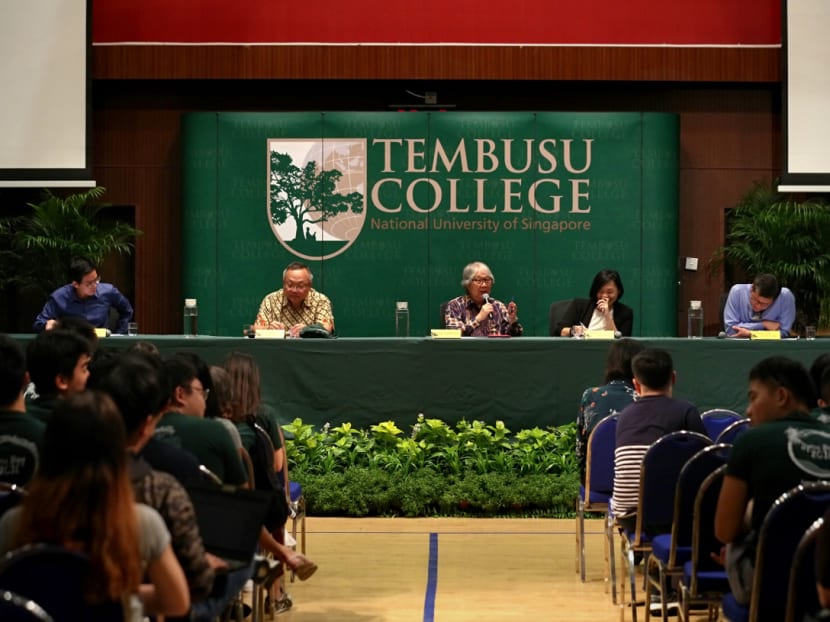Next PM likely to retain status quo: Panel
SINGAPORE — With the identity of Singapore’s next Prime Minister still up in the air, several past and present Nominated Members of Parliament (NMPs) – who were speaking on Tuesday (March 20) at a forum on the political succession – noted that there is no standout candidate from the fourth-generation leadership.

Professor Tommy Koh, Rector of the Tembusu College at NUS, speaks during the forum "Singapore's Fourth Prime Minister: Aspirations and Expectations” at the NUS Tembusu College, March 20, 2018. Photo: Nuria Ling/TODAY
SINGAPORE — With the identity of Singapore’s next Prime Minister still up in the air, several past and present Nominated Members of Parliament (NMPs) – who were speaking on Tuesday (March 20) at a forum on the political succession – noted that there is no standout candidate from the fourth-generation leadership.
Nevertheless, regardless of who Mr Lee Hsien Loong’s successor will be, some of the speakers felt that in general, it will be more of the same, with the new leader unlikely to veer from the tried and tested ways.
“When we talk about the fourth-generation leadership, part of the difficulty (in identifying a successor) is that none of them have really left a deep enough impression,” said former NMP and Singapore Management University law don Eugene Tan.
Associate Professor Tan, social entrepreneur Kuik Shiao-Yin and businessman Zulkifli Baharudin were the speakers at the forum – moderated by Ambassador-at-large Tommy Koh – held at the National University of Singapore’s Tembusu College, titled Singapore’s Fourth Prime Minister: Aspirations and Expectations.
Minister in the Prime Minister’s Office Chan Chun Sing, Finance Minister Heng Swee Keat and Education Minister (Higher Education and Skills) Ong Ye Kung have emerged as frontrunners for the top post. Assoc Prof Tan noted: “They all come across fairly similar.”
He argued that the next PM needs to stamp his mark, and show who he is and what defines him, “even as the collective leadership principle is dominant in our system of government”.
“Singaporeans increasingly expect that of their leaders – that they are not mere technocrats but are fully infused with values, principles, and ideals, and will stand up for what they believe in even with their backs against the walls,” Assoc Prof Tan added.
Agreeing, Ms Kuik noted that trust in a leader is cultivated by a combination of the public’s assessment of the person’s care for others, sincerity, competency and reliability. “Competency and reliability are about what you do and how you do it. And Singapore as a country is great at that,” she said.
She added: “The deeper levels of care and sincerity are grounded in whether people can sense: Do I know who you are? Do I know why you are here?”
Mr Zulkifli, executive chairman of logistics and supply chain company Indo-Trans Corporation, felt that Singaporeans are “likely to get the status quo” no matter which fourth-generation leader is picked.
“(Like it or not,) you have already decided who the Prime Minister is going to be,” said Mr Zulkifli, referring to the mould of the country’s next leader.
Mr Zulkifli, who is also Singapore’s non-resident ambassador to Uzbekistan and Kazakhstan, noted how political leadership in the Republic has been “defined in a certain way” over the past five decades since independence – individuals with stellar academic qualifications, good career track records in government-linked corporations and bureaucracy, and a moderate personality.
While people want a leader who is daring and transformative, “my own humble opinion is that we have inputted our own conservative attitudes in choosing the next generation leader”, he said.
“So we are not going to get it… It is a dilemma we all face,” he added.
At the event, Mr Tan Yang Long, 23, a second-year sociology undergraduate, read out a letter to the future PM.
Noting his cohort’s wish that the PM would champion “more real, open and civil interactions” about topics surrounding sexuality and religion, among others, he said: “Your appointment is the time for us to stop being cautious around diversity, to begin to embrace it courageously, and to trust us that we can handle this conversation.”
He added: “We hope that when you say, ‘for the people’, ‘for Singapore’, or ‘for us’, you include those among us who are trapped in the cracks we create, silenced by the lines we draw, or rendered invisible by the walls we build. After all, what is the city, but the people?”
In response to a question from a fourth-year political science student on whether it matters who is chosen as the country’s next PM, Professor Koh – who had worked under all three PMs – stressed how the top leader “very much sets the agenda, the tone, the direction of the Government”.
Referring to Singapore’s second and first PMs, Prof Koh noted how Mr Goh Chok Tong’s administration was “kinder, gentler” than during Mr Lee Kuan Yew’s time.
After Mr Goh took over the mantle in 1990, Prof Koh was appointed to chair a censorship review committee to incrementally liberalise Singapore’s censorship regime. Prof Koh recounted how he asked to meet Mr Lee to find out what he thought of the initiative.
“Mr Lee invited me to lunch and (told me) it is important for the new PM to set his own direction and his policies... Mr Lee told me that I should help PM Goh, and what I was about to do (would) have his full support,” he said.








